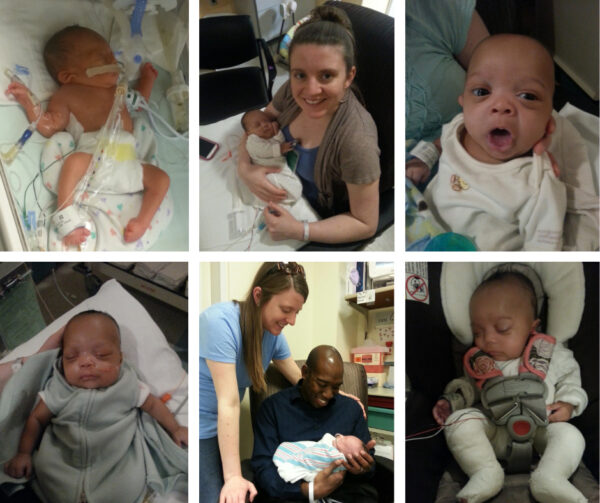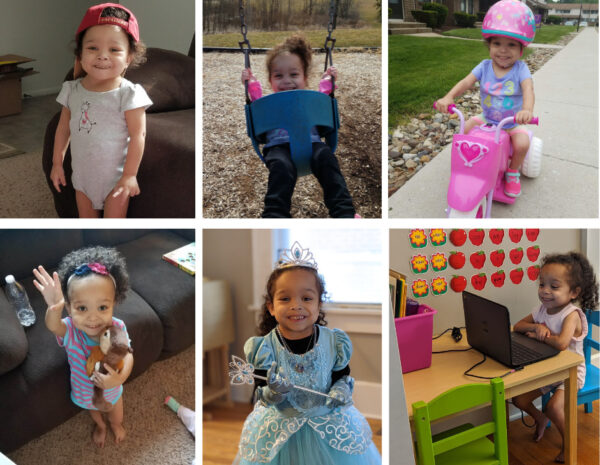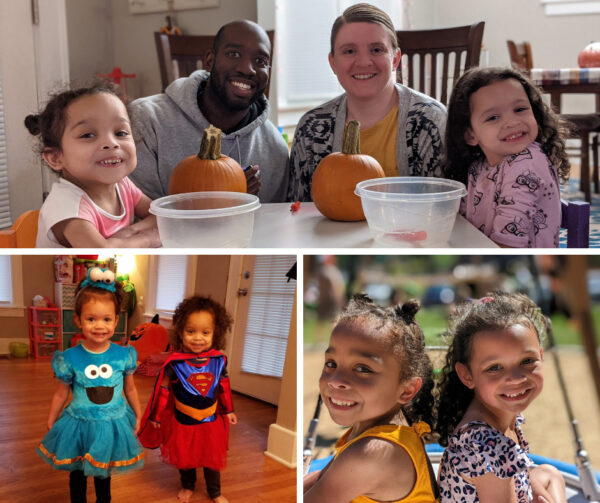
At a 20 week ultrasound, Gabrielle’s parents learned she would need a medical team to help her manage the affects of gastroschisis and bilateral clubbed feet.
When Sarah and Terrell Richardson received the news their daughter, Gabrielle, had gastroschisis, they had no idea what it was or how to help her. Their questions led them at Akron Children’s Maternal Fetal Medicine where they were connected with specialists and a care plan before Gabrielle arrived.
“We met with specialists regularly to keep an eye on Gabrielle’s progress during pregnancy. We also toured the NICU and met with surgery to talk about her (short gut) surgery, Dr. Garcia about her ongoing gastro care and Dr. Adamczyk to learn about castings and tendon surgery to correct her bilateral clubbed feet,” said Sarah Richardson. “It was really overwhelming to think about the journey ahead for a our little girl.”
As Gabrielle’s family prepared to become new parents, her surgery, gastroenterology and orthopedic teams were also making plans for her arrival. Born 10 weeks premature, Gabrielle’s first stop wasn’t her parents’ arms; it was the embrace of the NICU staff at Akron Children’s.

While in the NICU, Gabrielle had surgeries to help her body get the nutrients needed to thrive. She also began castings for her clubbed feet.
Just minutes old, Gabrielle was transported to the NICU where Akron Children’s pediatric surgeon, Todd Ponsky, MD, FACS, removed most of her small intestine and some of her large intestine.
“Dr. Ponsky was honest with us and very caring after Gabrielle’s surgery,” said Sarah. “He made us feel like we mattered by listening to our concerns and advocating for Gabrielle when we needed one most.”
While in the NICU , Gabrielle had a broviac surgically placed to help administer total parenteral nutrition (TPN) and a g-tube for feedings.

Dr. Reinaldo Garcia has monitored Gabrielle’s progress from the start to ensure her body was gaining the nutrients needed to grow, learn and play.
TPN is a feeding technique that is given intravenously into a major blood vessel near the patient’s heart to get nutrients straight into the blood stream. Bypassing the gastrointestinal tract altogether prevents malnutrition while giving Gabrielle’s body time to heal.
“TPN is frequently used in severe short gut and has changed the prognosis for patients like Gabrielle. In the past, patients with short gut syndrome had a very low survival rate,” said Reinaldo Garcia-Naviero, MD, gastroenterologist at Akron Children’s. “TPN and small intestinal transplant are tools that are changing that outcome; however, 90 percent of the care and outcome of short gut is on the parents. Gabrielle has great parents and that is why she is doing so well.”
Dr. Garcia began seeing Gabrielle weekly in the NICU to monitor and adjust her TPN based on fluid and nutrient intake and growth. Once home, Gabrielle’s parents learned how to prepare and administer TPN. As she progressed, appointments became less frequent but still constant. After 3 years, she was taken off TPN. Now, 8, Gabrielle sees Dr. Garcia every 3-4 months for check-ups and is close to having her g-tube removed since she is able to eat everything by mouth.

Family support is key to Gabrielle’s amazing progress. Pictured above with her dad, mom and little sister, Olivia.
Throughout Gabrielle’s journey, her parents were concerned about all the unknowns.
“We constantly wondered if TPN would be successful; if she’d need more surgeries; if she’d be able to live a ‘normal’ life; and, honestly, how we’d afford all of her care?” said Sarah. “What we found were countless staff members who helped us take care of Gabrielle at every step – NICU, home visits, hospital stays – and we are very grateful…Dr. Garcia has helped us through this very difficult journey with kindness, professionalism, grace and humor. He continues to instrumental in Gabrielle’s progress.”

Gabrielle has always loved school. She’s now in 3rd grade and getting ready to have her g-tube removed because she’s able to digest solid foods on her own!
Today, Gabrielle loves learning and being with her friends. She wants to be a teacher when she grows up but, until then, she enjoys playing with her sister, Olivia, baking, riding her scooter and doing crafts.
For more information on how Akron Children’s cares for patients with gastroschisis, contact Akron Children’s at 330-543-4488.










